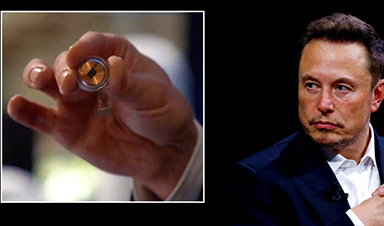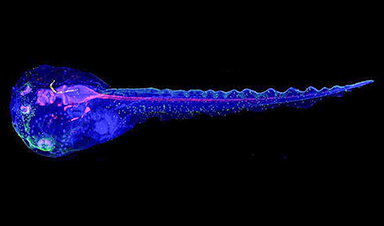Elon Musk has claimed the first human patient implanted with his wireless Neuralink brain chip can move a computer cursor ‘just by thinking’.
‘Progress is good, and the patient seems to have made a full recovery, with neural effects that we are aware of,’ Musk said in a Spaces event X.
‘Patient is able to move a mouse around the screen by just thinking.’
Musk said Neuralink, a company working to develop a brain-computer interface (BCI) that can be poked into human brains, is now trying to get as many mouse button clicks as possible from the patient.
Neuralink wedged its first product, called Telepathy, in a person last month.
Musk, the billionaire chief executive of Tesla and SpaceX, said Telepathy’s initial users will be those with paralysis.
The dream, Musk says, is to help make phone and computer control possible outside of a lab setting. (Similar earlier tests have involved people being connected to a computer with a cord.)
It’s hoped users will be able to control electronic devices ‘just by thinking’.
The company does not have approval from the US Food and Drug Administration to sell the device but was given the green light for human trials after officials evaluated its safety risks.
Volunteers for the first human clinical trials are ‘open’, Neuralink says, for people with limited or no use of both hands due to a cervical spine injury or a neurological disorder that affects nerve cells called neurological disorder that affects nerve cells
‘This study involves placing a small, cosmetically invisible implant in a part of the brain that plans movements,’ Neuralink’s website reads.
‘The device is designed to interpret a person’s neural activity, so they can operate a computer or smartphone by simply intending to move – no wires or physical movement are required.’
Subjects in the company’s PRIME study - short for Precise Robotically Implanted Brain-Computer Interface – have a coin-sized chip surgically inserted by a robot in a part of the brain that controls movement intention.
The tiny computer, called N1, contains 64 flexible polymer threads that provide 1,024 sites for recording brain activity.
Experts say that the technology is still rather far off and won’t be on the market for a good few years.
Neuralink may also have to slow down a bit, Dr Mhairi Aitken, an ethics research fellow at The Alan Turing Institute, told Metro.co.uk.
‘The advances with Neuralink are worrying in that they appear to be moving forward at a rapid pace without a great deal of transparency and without the usual scientific oversight,’ he said.
‘AI offers great potential in assistive technologies for people with disabilities but it needs to be developed responsibly and cautiously.
‘The vision that this technology will enable people in the future to connect with machines and communicate with AI, drives a type of innovation that risks making humans more machine-like rather than focussing on creating AI to support and help humans in their lives today.’
Long-term studies are needed to ensure the devices are safe and ethical, with worries of the immediate impact of the device – think strokes and vasculature damage – being the ones to watch.
Neuralink’s study brochure says that volunteers will be followed for five years.
How transparent the study is has also come under fire. It’s nowhere to be found on ClinicalTrials.gov, the US National Institutes of Health’s online registry.
In 2022, animal rights groups alleged Neuralink ‘mutilated monkey brains’, while the Physicians Committee for Responsible Medicine non-profit accused it of conducting ‘invasive and deadly’ experiments on primates.
With all these worries, doubts and criticisms, Musk showing off the chip’s computer cursor-wiggling powers isn’t a surprising one, says Dr Andrew Jackson, a professor of neural interfaces at Newcastle University’s Biosciences Institute.
‘What we don’t know is whether their BCI, is performing better than previous technologies that have been used to do this kind of thing, and that would require seeing their data and ideally publishing results from their studies,’ he told Metro.co.uk.
‘But it sounds plausible and a sensible thing that they would want to show having implanted the device.’
News
AI matches doctors in mapping lung tumors for radiation therapy
In radiation therapy, precision can save lives. Oncologists must carefully map the size and location of a tumor before delivering high-dose radiation to destroy cancer cells while sparing healthy tissue. But this process, called [...]
Scientists Finally “See” Key Protein That Controls Inflammation
Researchers used advanced microscopy to uncover important protein structures. For the first time, two important protein structures in the human body are being visualized, thanks in part to cutting-edge technology at the University of [...]
AI tool detects 9 types of dementia from a single brain scan
Mayo Clinic researchers have developed a new artificial intelligence (AI) tool that helps clinicians identify brain activity patterns linked to nine types of dementia, including Alzheimer's disease, using a single, widely available scan—a transformative [...]
Is plastic packaging putting more than just food on your plate?
New research reveals that common food packaging and utensils can shed microscopic plastics into our food, prompting urgent calls for stricter testing and updated regulations to protect public health. Beyond microplastics: The analysis intentionally [...]
Aging Spreads Through the Bloodstream
Summary: New research reveals that aging isn’t just a local cellular process—it can spread throughout the body via the bloodstream. A redox-sensitive protein called ReHMGB1, secreted by senescent cells, was found to trigger aging features [...]
AI and nanomedicine find rare biomarkers for prostrate cancer and atherosclerosis
Imagine a stadium packed with 75,000 fans, all wearing green and white jerseys—except one person in a solid green shirt. Finding that person would be tough. That's how hard it is for scientists to [...]
Are Pesticides Breeding the Next Pandemic? Experts Warn of Fungal Superbugs
Fungicides used in agriculture have been linked to an increase in resistance to antifungal drugs in both humans and animals. Fungal infections are on the rise, and two UC Davis infectious disease experts, Dr. George Thompson [...]
Scientists Crack the 500-Million-Year-Old Code That Controls Your Immune System
A collaborative team from Penn Medicine and Penn Engineering has uncovered the mathematical principles behind a 500-million-year-old protein network that determines whether foreign materials are recognized as friend or foe. How does your body [...]
Team discovers how tiny parts of cells stay organized, new insights for blocking cancer growth
A team of international researchers led by scientists at City of Hope provides the most thorough account yet of an elusive target for cancer treatment. Published in Science Advances, the study suggests a complex signaling [...]
Nanomaterials in Ophthalmology: A Review
Eye diseases are becoming more common. In 2020, over 250 million people had mild vision problems, and 295 million experienced moderate to severe ocular conditions. In response, researchers are turning to nanotechnology and nanomaterials—tools that are transforming [...]
Natural Plant Extract Removes up to 90% of Microplastics From Water
Researchers found that natural polymers derived from okra and fenugreek are highly effective at removing microplastics from water. The same sticky substances that make okra slimy and give fenugreek its gel-like texture could help [...]
Instant coffee may damage your eyes, genetic study finds
A new genetic study shows that just one extra cup of instant coffee a day could significantly increase your risk of developing dry AMD, shedding fresh light on how our daily beverage choices may [...]
Nanoneedle patch offers painless alternative to traditional cancer biopsies
A patch containing tens of millions of microscopic nanoneedles could soon replace traditional biopsies, scientists have found. The patch offers a painless and less invasive alternative for millions of patients worldwide who undergo biopsies [...]
Small antibodies provide broad protection against SARS coronaviruses
Scientists have discovered a unique class of small antibodies that are strongly protective against a wide range of SARS coronaviruses, including SARS-CoV-1 and numerous early and recent SARS-CoV-2 variants. The unique antibodies target an [...]
Controlling This One Molecule Could Halt Alzheimer’s in Its Tracks
New research identifies the immune molecule STING as a driver of brain damage in Alzheimer’s. A new approach to Alzheimer’s disease has led to an exciting discovery that could help stop the devastating cognitive decline [...]
Cyborg tadpoles are helping us learn how brain development starts
How does our brain, which is capable of generating complex thoughts, actions and even self-reflection, grow out of essentially nothing? An experiment in tadpoles, in which an electronic implant was incorporated into a precursor [...]
























